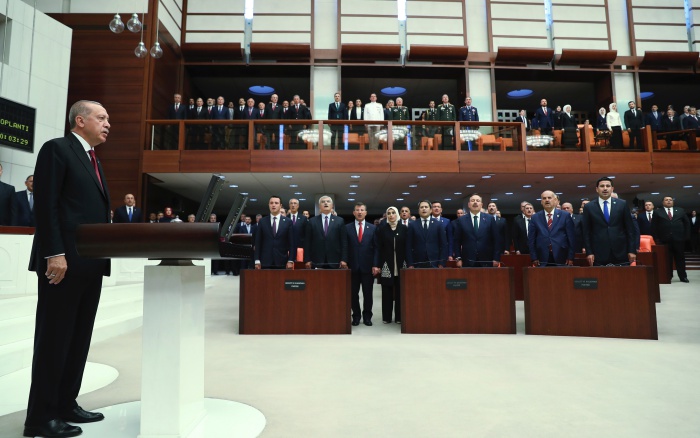A system in which the president enjoys sweeping powers came into force in Turkey on Monday after Recep Tayyip Erdoğan took the presidential oath in the Turkish Parliament to again become the country’s head of state.
Erdoğan was re-elected in snap polls held on June 24, when the country also voted in a snap general election.
Turkey switched to the presidential system from a parliamentary system thanks to a constitutional reform package that was approved by the public in a referendum in April 2017.
“As president, I swear upon my honor and integrity, before the great Turkish nation and history, to work with all my power to protect and exalt the glory and honor of the Republic of Turkey,” Erdoğan told Parliament as he took the oath of office on Monday afternoon.
Erdoğan’s Justice and Development Party (AKP) deputies in Parliament gave him a minute-long standing ovation after he was sworn in. Deputies of the opposition parties — the Republican People’s Party (CHP), the Peoples’ Democratic Party (HDP) and İYİ (Good) Party — remained seated without applauding.
Nationalist Movement Party (MHP) deputies also applauded Erdoğan. The MHP was an election ally of the AKP.
The introduction of the new presidential system marks the biggest overhaul of governance since the Turkish Republic was established on the ruins of the Ottoman Empire nearly a century ago.
The post of prime minister has been scrapped, and the president will now be able to select his own cabinet, regulate ministries and remove civil servants, all without parliamentary approval.
Opponents of the executive presidency say the move marks a lurch to authoritarianism, accusing Erdoğan of eroding the secular institutions set up by modern Turkey’s founder, Mustafa Kemal Atatürk, destroying the separation of powers and driving it further from the Western values of democracy and free speech.
On Monday evening, a celebration was held at the presidential palace in Ankara’s Beştepe neighborhood that was attended by more than 7,000 guests including Venezuelan President Nicolas Maduro, Russian Prime Minister Dmitry Medvedev and Sudan’s President Omar Hassan al-Bashir, who is wanted for war crimes by the International Criminal Court.
No major Western leader featured on a list of 50 presidents, prime ministers and other high-ranking guests published by state news agency Anadolu.
Turkey’s 11th President Abdullah Gül and former prime ministers Tansu Çiller and Mesut Yılmaz as well as former Ankara Mayor Melih Gökçek were among the guests at the evening ceremony.
Delivering a speech at the ceremony, Erdoğan said he has assumed the post of president once again, this time with “all the powers of the executive organ.”
A special TL1 coin was minted on the occasion of Erdoğan’s inauguration.
“In the new term, Turkey will go forward further in every area from [improvement in] democracy to fundamental rights and freedoms, from the economy to major investments,” he said.

